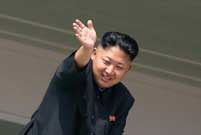 China's new-type guided missile frigate 'Bengbu' in live fire training
China's new-type guided missile frigate 'Bengbu' in live fire training
 Photo story: A primary school of only two people
Photo story: A primary school of only two people
 Flight team performs first show abroad
Flight team performs first show abroad
 The last days of Wan Aihua- a 'comfort woman' during the WWII
The last days of Wan Aihua- a 'comfort woman' during the WWII
 Top 10 private Chinese enterprises 2013
Top 10 private Chinese enterprises 2013
 'College campus queens' welcome the new students in Hunan
'College campus queens' welcome the new students in Hunan
The Japanese government said Thursday it will lodge a formal complaint about a cartoon published in a French weekly newspaper depicting sumo wrestlers with extra limbs in front of the Fukushima nuclear power plant.
Government officials said the satirical caricature was " tasteless" and seemingly taking aim at the decision to grant Tokyo the rights to host the 2020 Summer Olympics amid an ongoing nuclear crisis at the Fukushima complex located 150 km northeast of the capital city.
The cartoon, carried in Le Canard Enchaine, a newspaper known for its satirical take on topical issues, shows two emaciated sumo wrestlers -- one with three legs, the other with three arms -- facing off in a bout with the Fukushima plant in the background.
In the cartoon a sports announcer states: "Marvelous! Thanks to Fukushima, sumo is now an Olympic sport."
"The report was inappropriate. It is extremely regrettable," Chief Cabinet Secretary Yoshihide Suga told a press conference, adding "this cartoon hurts the feelings of those who suffered through the Great East Japan Earthquake."
In March 2011, an earthquake-triggered tsunami ravaged Japan's northeast and sparked the world's worst nuclear disaster since Chernobyl in 1986 in the Fukushima nuclear plant.
"It is inappropriate and gives a wrong impression of the Fukushima contaminated water issue," Suga added.
Another cartoon comprising a spread in the same French publication shows two people in front of a pool wearing anti- radiation suits and holding geiger counters. The cartoon is captioned: "There is already a pool in Fukushima for the Olympics, " -- a reference either to the spent nuclear fuel pools, or pools of contaminated water leaking at the plant.
Suga said Japan would lodge its complaint with Le Canard Enchaine through the French embassy in Tokyo and that the Foreign Ministry had been directed to "thoroughly explain the situation" to avoid similar incidents.
The satirical cartoons from France come at a time when the global spotlight is firmly trained on Japan following the International Olympic Committee (IOC) awarding Tokyo with the Summer Olympics in 2020, ahead of rival cities Istanbul and Madrid.
The IOC's decision, made on Sept. 7, favored Tokyo in part because of Japanese Prime Minister Shinzo Abe's assurances that the Fukushima crisis has not and will not affect Tokyo and that the Games were in "safe hands."
However, Tokyo Electric Power Co. (TEPCO) operator of the crippled nuclear complex said this week that there are possibly two leaks in tanks storing highly-radioactive water at the facility, with the second leak causing radiation levels to spike from 650 becquerels per liter found near the first leak, to 3,200 becquerels per liter of radioactive substances detected at a trench near the second leak.
 DPRK holds military parade to mark 65th founding anniv.
DPRK holds military parade to mark 65th founding anniv. Highlights of MAKS 2013 Int'l Aviation and Space Show
Highlights of MAKS 2013 Int'l Aviation and Space Show  10th China-ASEAN Expo opens in Nanning
10th China-ASEAN Expo opens in Nanning Eagle Boy takes to sky to break another record
Eagle Boy takes to sky to break another record 12-year-old boy becomes pillar of the family
12-year-old boy becomes pillar of the family Eye-gouged boy receives blind rehabilitation in Shanxi
Eye-gouged boy receives blind rehabilitation in Shanxi Top 10 naked hotels in the world
Top 10 naked hotels in the world The most gorgeous Chinese women in the eyes of foreigners
The most gorgeous Chinese women in the eyes of foreigners A collection of bizarre rooftop buildings around China
A collection of bizarre rooftop buildings around China Residences of the royal house of Savoy
Residences of the royal house of Savoy China's frigate 'Bengbu'in fire training
China's frigate 'Bengbu'in fire training Fresh students 'forced' to register in university independently
Fresh students 'forced' to register in university independently 2013 Taiwan Int'l Tourism Expo kicks off in Taipei
2013 Taiwan Int'l Tourism Expo kicks off in Taipei Photo story: Take a gap year
Photo story: Take a gap year Nokia's Global Headquarters: visiting a declining empire
Nokia's Global Headquarters: visiting a declining empireDay|Week|Month